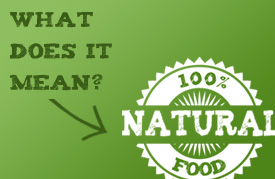1. Clinton Amos et al. ““Natural” labeling and consumers’ sentimental pastoral notion“. Journal of Product & Brand Management. 2014 23:4/5, 268-281. Print.
In their article, Amos et al. identify the images and associations which are linked to the term “natural.” My thesis will discuss the ways in which the food industry purposefully obfuscates labels and terminology in ways which strictly benefit the seller rather than the less educated and informed consumers. One of the ways in which this can be done is to purposefully use terminology which is poorly defined or indeed has multiple meanings. In this article, published in the Journal of Product and Brand Management, the authors use surveys and experiments to qualify the images and feelings which consumers associate with the term “natural.” Notably, this study builds on prior work which suggests most consumers have a naively pastoral view of nature and that products labeled as natural possess inherent benefits such as health advantages, lack of contamination and safety. Unlike the term “organic” however, there is no regulation or definition of the term “natural.” This research helps to identify what value consumers assign to the term natural and why. 
2. Food Beliefs: Elicitation, Estimation and Implications for Labeling Policy
This article describes research in which the authors attempt to quantify the way in which consumers combine their own preferences and beliefs with nutritional labels and terminology to form beliefs about the quality of a product. The price which a consumer has been willing to pay for a product has classically been the most readily quantifiable indicator for a consumer’s beliefs about quality. However, consumers must both have some sort of product preference and must hold certain beliefs about how well any individual product conforms to those preferences for the consumer to decide how much they value and are therefore willing to pay for that product. This article describes research which attempts to quantify how food labels affect the consumer’s beliefs about a product without the confounding factor of the subjects individual preferences for a characteristic. The discussion is pertinent because it describes similar experiments which could help separate informative labeling practices from marketing messages.
